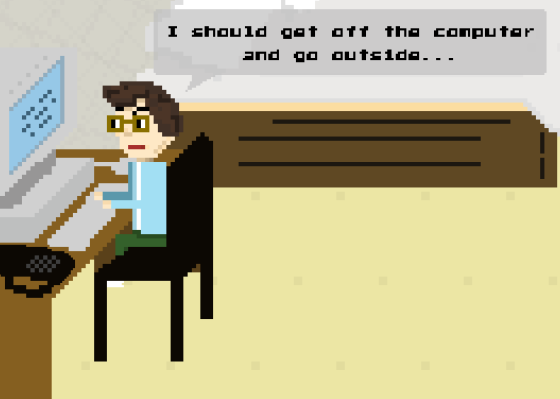Will Sheff of Okkervil River performs on stage at Teatre Colisium on Nov. 10, 2011, in Barcelona
Once upon a time, all that was expected from musicians is that they, well, make music. Then, not so long ago, a musician with any hope of being successful had to make videos too, so audiences could also watch the music. Now, it seems, even that may not be enough: Today’s musicians, some think, have to make music, videos and some sort of interactive multimedia attraction for listeners.
This trend has been coming for a while—in 2010, Arcade Fire made a haunting exploration of the capacities of HTML 5 with the short film The Wilderness Downtown—but the past few weeks saw the release of an interactive website for the latest Edward Sharpe & the Magnetic Zeros album as well as what is probably the apotheosis of the trend: the game released by Okkervil River to go with their new album, The Silver Gymnasium, out this week.
Yes, a game—a faux-8-bit, “arrow keys to walk” game, the first chapter of which is available online now.
(MORE: The 11 Best Music Videos of 2013 (So Far))
One possible—and obvious—reason for the trend is technological. It’s now, in many ways, easier and cheaper to make a game or animation than it is to make a traditional music video, though that wasn’t always the case. In fact, Okkervil River’s Will Sheff says that the game idea has been in the works far longer than it’s been a trend, but the means to create one didn’t exist until recently. “I grew up on games like King’s Quest and, before that, Atari. Most of it was stuff that I’d play over at my friends’ houses, which leant it even more of an air of excitement. It was like this special pilgrimage,” he says. “The technology and the budget caught up with the idea.”
The other reason, Sheff says, is that even the best music video in the world can no longer hold viewers’ attention. “A lot of people don’t put time in to build their attention spans up so it starts to wither. Sometimes you’re making a video and putting all this love into every little detail, and then you and realize that probably a third of the people who click on the video aren’t going to watch it to the end, even if they like it,” he says. “You get distracted or you think you’ll watch it later or, almost as an automatic motion, your fingers redirect you to a different browser.”
Another option for the attention span problem? Take the music off the computer and put it in a movie theater; Sheff is also working on an Okkervil River film. In the mean time, the video game does the trick by requiring constant participation from user. “[With games], you really have the ability to jam your fingers into people’s brains and wiggle them around a little bit,” he says. “I really like that.”


